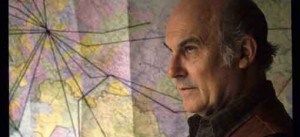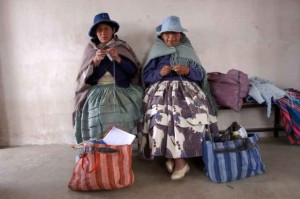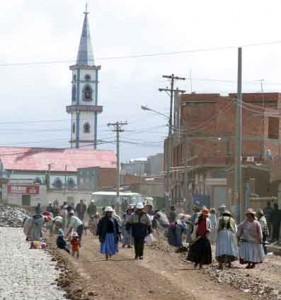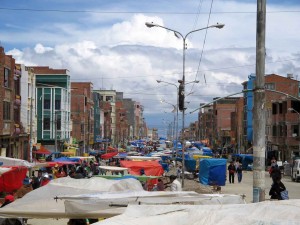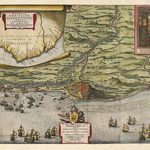From The Web – Kapuscinski Development Lectures
Ryszard Kapuscinski (1932-2007) was a Polish journalist and writer who covered developing countries. Kapuscinski, whose books were translated into many languages, was often named the “Third World Chronicler” or the “Voice of the Poor” for his famous reportages and books describing developing countries on all continents. Among other books, he was famous for: “The Emperor” on Ethiopia, “Shah of Shahs” about Iran, “The Shadow of the Sun” about Africa, “Another Day of Life” about Angola, and “Imperium” about the Soviet Union.
Read more: http://kapuscinskilectures.eu/
Dubbele loyaliteit of nieuw heidendom? Onderzoek naar de samensmelting van religies in de Andes
Inleiding
De bloei van de zogenoemde ‘indiaanse of inheemse theologie’ in de afgelopen twintig jaar in Latijns-Amerika is een indicatie voor de diverse veranderingen die er plaats hebben gevonden op politiek, cultureel en kerkelijk gebied. Deze veranderingen zijn niet homogeen van aard en er bestaat al helemaal geen consensus over de interpretatie ervan. Sinds 1990 worden er zogenoemde Continentale Bijeenkomsten over de ‘indiaanse theologie’ georganiseerd, welke mede werden geïnspireerd door de mijlpaal van vijfhonderdste verjaardag sinds de verovering van Abya Yala (het inheemse woord voor het Amerikaanse continent) en de gunstige politieke conjunctuur met betrekking tot de Indianen. In dit artikel probeer ik een interculturele en interreligieuze analyse te geven van deze ontwikkelingen en de gevolgen hiervan voor de religie in de Andes. Read more
Het multiculturele Bolivia van Evo Morales – Nieuwe vormen van burgerschap – Deel Een
Op 21 januari 2010 werd Evo Morales Aima voor de tweede maal geïnaugureerd als president van Bolivia. Precies vier jaar eerder, op 21 januari 2006 accepteerde Evo Morales, de eerste inheemse president van Bolivia, al een keer zijn ‘inheemse autoriteit’ tijdens een kleurrijke ceremonie in Tiwanaku, een indrukwekkende archeologische plaats ongeveer 70 kilometer van La Paz, de (informele) hoofdstad van Bolivia. Getooid in de traditionele kledij van een inheemse mallku – ‘condor’ of inheemse leider – werd hij toegejuicht door duizenden aanhangers die zwaaiden met de wiphala, de kleurrijke vlag die – hoewel dit ook betwist wordt – symbool staat voor alle inheemse volkeren van Zuid-Amerika. Vervolgens werd de president op 22 januari ’s ochtends beëdigd in het parlement door het omhangen van de presidentiële sjerp en het afleggen van de gelofte om de grondwet te respecteren. Rechterlijke en militaire prominenten, een aantal belangrijke buitenlandse politici en de nieuw verkozen leden van het parlement waren aanwezig.
Read more
Het multiculturele Bolivia van Evo Morales – Nieuwe vormen van burgerschap – Deel Twee
Aymara’s in El Alto: Traditie en vernieuwing
El Alto werd in Bolivia het zenuwcentrum van de protesten tegen het neoliberale beleid. In het overwegend inheemse El Alto (zie verder) werd dit beleid gezien als de politiek “van mestiezen en blanken”. De protesten die uiteindelijk leidden tot het vertrek van Sánchez de Lozada begonnen in El Alto begin september 2003 en breidden zich aanzienlijk uit nadat een protest in het stadje Warisata op de hoogvlakte hard uiteen werd geslagen door het leger, waarbij zes doden vielen. Na verschillende dagen van protesten en blokkades in El Alto ontstonden (voornamelijk benzine) tekorten in La Paz – alle verkeer naar La Paz moet namelijk door El Alto. Sánchez de Lozada en zijn regering besloten dat er een door militairen bewaakt konvooi van tankwagens door El Alto moest komen. De gevolgen waren gruwelijk: er vielen 67 doden die dag.
Read more
From The Web – Africacheck.org
 Africa Check is a non-partisan organisation that exists to fact-check claims made in the public arena, impartially and fairly, and publish the results. We also aim to spread the culture and enable the practice of fact-checking among the wider journalistic community.
Africa Check is a non-partisan organisation that exists to fact-check claims made in the public arena, impartially and fairly, and publish the results. We also aim to spread the culture and enable the practice of fact-checking among the wider journalistic community.
In carrying out our work, we seek to abide by the best fact-checking practices, and adhere to three fundamental principles.
Impartiality: We seek, over time, to check all sides in any debate and we base our reports on fact not opinion.
Verifiability: We set out the evidence for our reports in such a way that readers may verify it for themselves.
Openness: Where we make mistakes, we correct as quickly and openly as possible.
How we work
How we select the claims
Each working day the Africa Check editor meets with colleagues to assess claims made in the public domain in South Africa and sift suggestions sent in by visitors to the site. We focus on claims that touch on the three broad areas of interest identified by the site and that may have significant impact if unchecked. And we strive to ensure that, over time, we check all the main sides in any debate.
Writing our reports
In writing our reports, we only use information that the readers can themselves verify. When setting out our conclusions, we link to the evidence we use be that a photo, photos, video, public documents or data analysis.
Read more: http://www.africacheck.org/
Time to say Goodbye. Again.
 Prologue
Prologue
You are cordially invited to read the following notes – but please accept: though reading the reflections is hopefully at times entertaining, the notes are not easy to comprehend, presenting thoughts as they are: interconnected, being a complex structure that cannot be easily deconstructed without doing damage to the overall existence. It had been the easy ways of looking at history that allowed the total demonisation of Zarathustra – in the postscript you will see the reasoning behind this reference. Having said this, you should allow the postscript to be a postscript, as I would otherwise made it myself a Prologue or a Prolegomena.
Looking once back, aiming on a huge leap forward – or: Luhmann’s Strawberry Cake
Each second we live is a new and unique moment of the universe, a moment that will never be again. And what do we teach our children? We teach them that two and two make four, and that Paris is the capital of France.
When will we also teach them what they are? We should say to each of them: Do you know what you are? You are a marvel. You are unique. In all the years that have passed, there has never been another child like you. Yes, you are a marvel. And when you grow up, can you then harm another who is, like you, a marvel?
You must work, we must all work, to make the world worthy of its children. – Pablo Picasso
